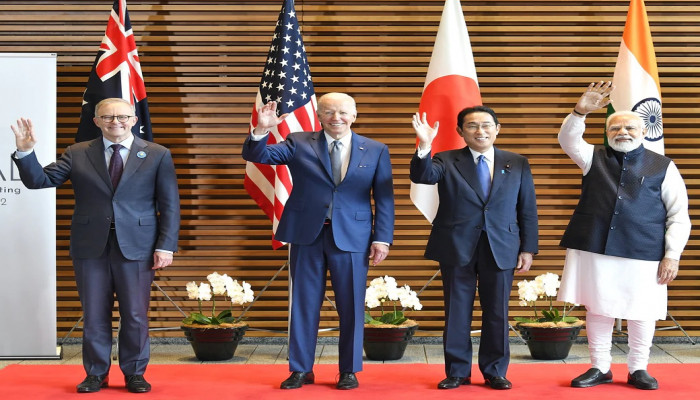Quad Summit Unveils a Framework for New Dimensions of Cooperation
- In Foreign Policy
- 02:07 PM, May 27, 2022
- Ramaharitha Pusarla
Even as Russian aggression continues to dominate the geopolitical conversations, Indo-Pacific with its strategic and geographical salience has turned into a ground for contestations. Turning focus away from the heated Eurasian front, reassuring allies President Biden made a five-day visit to South Korea and Japan, which hosted the Quad summit. The security situation of the region has become so perilous that the US spy planes flew over the Korean Peninsula twice ahead of the Biden’s visit amid reports of a likely ICBM testing by North Korea.
Fixated on taking over its weakest enemy, the US thus far expended resources and energy on strengthening its trans-Atlantic alliance. Switching gears, intent on making some meaningful difference in the region which has tremendous geopolitical and economic heft, Biden attended the second in-person Quad summit in Tokyo.
Embroiled by China’s aggressive policies, a plausible Taiwan invasion, continuing Sino-India logjam, and an unabated missile testing by North Korea, Indo-Pacific has become a potential flashpoint. The formidable China challenge in the region has forced like-minded democratic countries to counter the hegemon. Beijing realizes this reality and therefore vehemently opposes the Quad. It firmly denounces the elevation of the geographical construct “Indo-Pacific” as opposed to the “Asia-Pacific” and always reserved its strident criticism towards the Quad.
Ahead of the Quad summit, at a press conference with Pakistan foreign minister Bilawal Bhutto by his side Chinese foreign minister Wang Yi remarked, that the Indo-Pacific strategy is “bound to fail” as it is vigorously promoted by Washington to “contain” Beijing. He added, that the Indo-Pacific strategy “cooked up” by the US, in the name of “freedom and openness”, is keen on forming “cliques”… to “change China’s surrounding environment”. Its purpose is to contain China and make Asia-Pacific countries serve as “pawns” of the US hegemony1.
Demolishing China’s contentious references to the Quad as “Asian NATO”, the Quad summit at Tokyo evolved a new framework for resilient cooperation in the Indo-Pacific. Reinventing itself as a “force for good”, the Quad leaders holding a summit for the fourth time, gave a new directionality to the Quadrilateral Security Dialogue. The Quad 1.0 envisioned by Japanese Prime Minister Shinzo Abe in the aftermath of the 2014 tsunami was revived a decade later when the new incarnate Quad 2.0 attempted to condition itself as a new grouping with a purpose.
Despite major leadership changes, drawn together by an issue-based agenda of “Free and Open Indo-Pacific” the member states- Australia, India, Japan, and the US made demonstrable progress. President Biden who largely disowned a majority of his predecessor’s policies reshaped the Quad. He summoned the first-ever virtual summit of Quad leaders in March 2021 and since then leaders held four meetings in a span of 14 months mirroring the burgeoning cohesiveness of the group.
Contrary to the speculations of India’s softer stance on Russian aggression derailing the unity, putting differences at bay Quad countries focussed on an integrative approach to shaping the region and the world at large. Barring a passing reference to the alarming humanitarian due to “tragic conflict raging in Ukraine”, it was business as usual at the Quad. Recognizing the need for providing an institutional void, in the most happening region of the World, the revitalized Quad has set ambitious agenda to cater to the aspirations of the Indo-Pacific. The announcement of the Indo-Pacific Economic Framework for Prosperity (IPEF) a day ahead of the Quad created quite a stir.
Thus far identified for unidimensional Malabar Naval exercises, trumping the skepticism over Quad’s strategic reality, the member states, which are democracies with pluralistic societies with similar structural aspects strongly reiterated support for the principles of freedom, rule of law, territorial integrity, UN charter and peaceful resolution of disputes. Condemning the use of force or unilateral attempts to change the status quo, underscored the need for freedom of navigation and overflight in East and South China for the peace and stability of the region. Ostensibly, true to its belligerent disposition, Chinese bombers flew nearby the Quad summit venue2 demonstrating its discomfiture over the coming together of the key stakeholders of the Indian and Pacific Oceans.
A stable Indo-Pacific region is crucial for global peace and prosperity. China’s bellicose policies and expansionism have impelled various countries and groups to evolve an Indo-Pacific strategy. The Quad underscored the centrality and unity of the ASEAN and reaffirmed support for the Pacific Islands Unity Forum, implementation of the ASEAN Outlook for the Indo-Pacific and welcomed the EU strategy for cooperation in the region.
China’s unilateral actions- reclamation and militarisation of disputed features in the South China Sea, instituting the ADIZ and new maritime law have steadily altered the regional balance. Now, China has fast-tracked a region-wide agreement on policing, security and data communication cooperation with Pacific Islands. Having failed to rein in China from clinching a security agreement with the Solomon Islands, the Quad is reiterating the need for a Free and Open Indo-Pacific more than ever. Interestingly, the US-driven Quad which has been vocal on the East and the South China Sea failed to make a mention of the ongoing Indo-China logjam.
In a similar vein, the Quad called for the implementation of the ASEAN Five Point Consensus for the Myanmar crisis and the denuclearisation of the Korean Peninsula. Condemning the Mumbai and Pathankot attacks, the Quad denounced terror proxies perpetrating cross-border terrorism. Underlining the need for upholding international standards in combatting the financing of terrorism Quad members collectively demand that Afghan territory must never be used to shelter or train or threaten or attack any country.
At the first virtual summit of the Quad leaders, three working groups on Climate change, vaccines, and critical and emerging technologies was launched. Three more working groups on cybersecurity, infrastructure and space were added to the list at the first in-person Quad summit in Washington in September 2021. Quad has pledged delivery of 1 billion covid vaccine doses by the end of this year and thus far, the group has delivered 670 million doses. Indo-Pacific countries Cambodia and Thailand were among the recipients of Made in India vaccines. With Quad expanding the arenas of cooperation, delivery would be key to earning confidence and trust.
At the height of the pandemic Quad engaged with other like-minded countries in the region and the US held the first Global Covid -19 Summit. As members of the Group of Friends of UHC (Universal Health Coverage) Quad evinced interest in reforming the global health architecture for enhancing PPR (Pandemic Prevention Preparedness and Response), committed $542 million to the next phase of the Coalition for Epidemic Preparedness for Innovation (CEPI) and coordinating efforts through “COVID-19 Prioritised Global Action Plan for Enhanced Engagement (GAP)” and COVAX Vaccine Delivery Partnership3.
The Indo-Pacific region with immense potential for growth and infrastructure assistance can drive productivity and prosperity. China’s opaque infrastructure initiatives have pushed several countries into a “Debt trap”. There is a dire need for a sustainable and transparent infrastructure initiative to meet the requirements of developing countries in the region. Quad announced $50 billion towards infrastructure investment over the next five years. The US has thus far envisioned and launched Build Back Better World (BBBW) and Blue Dot Network (BDN) as a counter to China’s BRI. Apart from infrastructure BBBW includes aspects like -health care, digital technologies, climate, and gender equality. While the initiatives are in infancy, the US is yet to develop an ambitious partnership and prove its implementation capabilities. Indeed, to promote debt sustainability and transparency, Quad plans to have a “Quad Debt Management Resource Portal” in close collaboration with finance authorities.
Expanding the scope of the climate change programs, countries launched Quad Climate Change Adaptation and Mitigation Program (Q-CHAMP) which includes green shipping and ports for building a green corridor framework; Climate information services for Pacific Island countries that are disaster-prone, building climate-resilient infrastructure through Coalition for Disaster Resilient Infrastructure (CDRI). To strengthen collaboration to effectively respond to disasters, Quad members announced the establishment of the “Quad Partnership on Humanitarian Assistance and Disaster Relief (HADR)”. To combat the menace of illegal fishing and China’s covert maritime aggression Quad launched -the Indo-Pacific Partnership for Maritime Domain Awareness (IPMDA) which works in coordination with Indo-Pacific countries and regional Information Fusion Centres. Besides promoting maritime domain awareness, IPMDA would effectively monitor the Chinese Naval and maritime militia activities.
Cognizant of cyber vulnerabilities, bolstering Quad Cybersecurity Partnership, Quad partners plan to initiate the first-ever Quad Cybersecurity Day. Pandemic has exposed chinks in the existing global supply chains as many countries reeled under the shortage of semiconductors. Realising the need to leverage complementary strengths, Quad has launched the Common Statement of Principles on Critical Technology Supply Chains to advance cooperation on semiconductors and other critical technologies. Cooperation in advanced technologies besides propelling economic growth can offer a new window of opportunities for a country like India.
Strengthening the cooperation in digital technologies, Quad plans to advance interoperability and security through new a Memorandum of Cooperation on 5G Supplier Diversification and Open RAN. Enhancing space cooperation “Quad Satellite Data Portal” that aggregates the Earth observation data was unveiled. To foster people-to-people ties, the bedrock for robust ties, Quad officially launched Quad Fellowship for students in STEM fields.
Quad members have fashioned out a framework of cooperation that can collectively mitigate the challenges posed by China in the region. The effectiveness of the Quad as a major strategic player will be determined by the seriousness of intent, timely implementation and a long-term commitment of the countries. But somewhere in their quest for fostering robust ties and seamless collaboration on non-traditional issues, while the Tokyo summit made the right noises, the core aspect of the security of the Indo-Pacific has been sacrificed. Having unleashed an ambitious vision for the region, the Quad will be judged for its delivery.
China has upended the regional balance with its unilateral and provocative actions and changed the status quo of the region. Instead of directly taking the illiberal hegemonic power to task, the Tokyo summit chose to “advance resilience, sustainability, inclusiveness, economic growth, fairness and competitiveness of (our) economies”. Through this initiative, the Quad aims to “contribute to cooperation, stability, prosperity, development and peace within the region”. The Tokyo Summit made a good beginning in terms of giving a massive fillip to the Indo-Pacific strategy. By toning down on the security aspect, the quintessential attribute of providing security by the Quad has been lost.
References
- https://indianexpress.com/article/world/ahead-quad-summit-china-us-indo-pacific-strategy-fail-7930833/
- https://www.newindianexpress.com/world/2022/may/24/grave-concerns-says-japan-aschina-russia-jets-allegedly-flynearbyquad-meet-venue-2457436.html
- https://mea.gov.in/bilateral-documents.htm?dtl/35357/Quad+Joint+Leaders+Statement
Image source: Free Press Journal
Disclaimer: The opinions expressed within this article are the personal opinions of the author. MyIndMakers is not responsible for the accuracy, completeness, suitability, or validity of any information on this article. All information is provided on an as-is basis. The information, facts or opinions appearing in the article do not reflect the views of MyindMakers and it does not assume any responsibility or liability for the same.







Comments